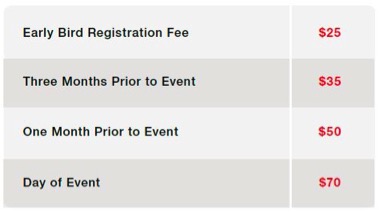- Home
- About Us
- The Team / Contact Us
- Books and Resources
- Privacy Policy
- Nonprofit Employer of Choice Award

 Should you really put your event on sale? A fee has a purpose. Maybe it’s to defray costs or supplement revenue, but whatever the purpose may be, you made a conscious decision to add a fee. Before slashing prices to try and encourage participation, consider the pros and cons of doing so. All too often, when organizations reveal a history of offering registration discounts, people become “addicted” to paying less.
Should you really put your event on sale? A fee has a purpose. Maybe it’s to defray costs or supplement revenue, but whatever the purpose may be, you made a conscious decision to add a fee. Before slashing prices to try and encourage participation, consider the pros and cons of doing so. All too often, when organizations reveal a history of offering registration discounts, people become “addicted” to paying less.
It plays out something like this: you or your manager notice that you haven’t recruited as many participants as you should have at this point. You remember that time when you offered a discounted registration fee and decided that you should do that again. You offer a discount and voila! You have more participants! You think to yourself, “Discounts really work!” So you start offering more of them. But then you begin to notice the consequences of discount code addiction.
Participants start to think like this:
“I’m not going to sign up now . . . I’ll just wait for the next sale.”
“I’ll call the office and get a code to register for free.”
“I’m going to search for a coupon code, and I’ll register if I can find one.”
“I signed up last week for $X, and now it’s cheaper. This isn’t fair!”
Data shows that participants who use discount codes tend to fundraise less often and raise less money, as well as tend not to make their own donations.
Here are a few long-term, sustainable strategies that can rescue you from discount code addiction.
• Don’t offer discounts! This can be adopted for any event, but it is a clearer choice if your event is new, if you’ve never offered discounts before, or your event is near capacity. You concentrate instead on making your event best in class so participants don’t hesitate to pay the fee.
• Use sliding scale fees. You don’t offer codes, but at certain well-published dates, you increase the registration fee. Your fee scale could look something like this:
The days and weeks leading up to the expiration of each fee can be publicized much like you would a discount code: “You have just five more days to take advantage of early bird registration!”
Offer discounts to priority participants. To show your appreciation, discounts can be used as retention incentives for top fundraisers and team captains. Offer these codes for a short period of time at the beginning of the season. The sense of urgency will help get your top participants back sooner. Custom discounts for corporate or sponsor teams. Arrange for corporate teams to pay for all team members, either at a full or discounted rate. Provide them with a discount code they can share, so there is no cost to the team member to register. This requires additional coaching resources to be allocated to these participants, as they may be less invested in the event and the cause. You can also offer “token” discounts to corporate teams.
These low value discounts—such as $5 off—are excellent for building relationships with team captains and leadership at those corporations. In either case, set up a discount code that reflects the branding of the team. For example, for a Blackbaud team, you could offer the code “BBAUD” or “BB5OFF”.
Fight the sale; fight the discount addiction with a smart strategy! Regardless of the strategy you select, your main goal should be to create a product that people will willingly pay for. The use of discounts can either be a gimmicky, slippery slope or a strategic endeavor that will ultimately increase revenue and loyalty to your event. Choose wisely, friends!
I am travelling to Canada next month for the inaugural Canadian P2P Conference. I’d love to connect with you there. I’ll be presenting on fundraiser retention and the strategies you should put in place to day to keep your fundraisers coming back year after year. Be sure to say hello if you are also attending.
Shana Masterson has been a fundraiser since 2001. In 2014, she joined Blackbaud as a senior consultant. Her unique skill set as both a peer-to-peer fundraiser and a technologist allows her to focus on maximizing peer-to-peer campaign revenue through success planning, data analysis, communication calendaring, configuration recommendations and more.
Prior to Blackbaud, Shana led the American Diabetes Association’s online fundraising and communication strategy for the national special events team. She also passionately raised funds for the National Brain Tumor Society, the American Cancer Society and the Muscular Dystrophy Association.